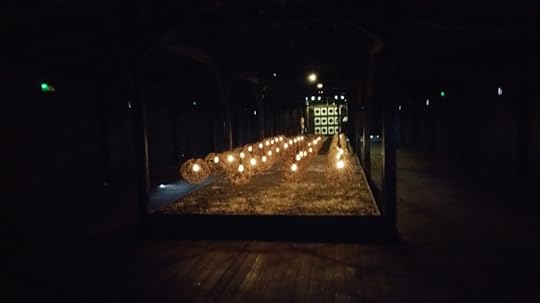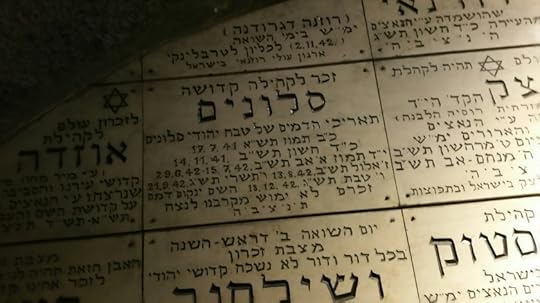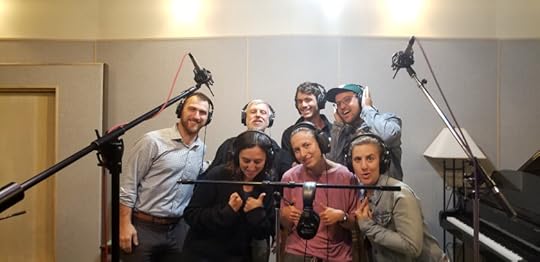Yom Hashoah- Make it Personal
 Photo: Memorial Lights in Barracks at Majdanek
Photo: Memorial Lights in Barracks at MajdanekIt’s been 76 years since the end of World War II. As I reflect on this, I am a bit shocked to realize that I was born only 16 years after the War. Maybe turning 60 makes the number 76 look not so far away. Today I have the opportunity, as we commemorate Yom Hashoah, to look back to 16 years before my birth, when the war ended.
My generation grew up in the immediate shadow of the Holocaust – the survivors were in our communities, some of them with numbers tattooed on their arms. Even if they didn’t speak of the horrors and the loss, we knew they had survived the Shoah. In Jewish Day School they showed us the footage of the camps being liberated with the piles of dead bodies and the emaciated, skeletal human figures wandering, reaching out their hands to the soldiers for food, for help. The number six million was thrown around everywhere. Six million murdered – our sisters and brothers – killed because they had a Jewish grandparent.
Still, it wasn’t until I joined the Goldberg family and heard the deeply personal stories of my in-laws, Sam and Esther Goldberg, that I internalized the depth of loss and suffering that took place. “Six million” numbs the mind and is impossible to visualize – it becomes a mantra, like “never again” and these mantras become meaningless over time.
Learning what happened to Sam and Esther put the horror into a frame that my mind could process. As I heard how Esther survived the Slonim massacre because she was in the hospital recovering from typhus, but her parents – Bracha and Shloime Zalman Wisznia, and her siblings – Yisroel Yoseph, Yitzchak, Shaina, and Shimon, were shot into a pit just out of town – I could felt pain deep in my soul – this is horror I can touch. I too have parents and siblings – I can attempt to imagine what I might feel like if one day, as I am recovering from illness, I discover that my parents and two brothers were all murdered in a horrific antisemetic shooting – family gone in an instant. This doesn’t feel like an impossibility after Pittsburg and Poway.
 Photo: Museum-Chamber of the Holocaust – memorial stone for Jews murdered at Slonim
Photo: Museum-Chamber of the Holocaust – memorial stone for Jews murdered at Slonim Sam described how in 1941 as a Soviet soldier he was captured by the Germans. He was a prisoner of war, exhausted and starving. He wanted to give up and end it all as he heard – “all Jews step forward” – he knew that meant a bullet to his head. It was only because of his friend, who he called “the Kafkazer,” who put a cube of sugar on his tongue, that he didn’t step forward and take the bullet. Somehow the sugar cube revived Sam and gave him the will to survive, to live one more day. When I heard this story from Sam, I could feel his exhaustion and his hunger and appreciate how another human being intervened and gave him hope and strength. I wonder if it was the care and concern of the Kafkazer more than it was the sugar cube itself that kept Sam alive. What a lesson we can learn about how to support one another when we see a friend in need.

Now that I am a Bubbi, I wonder what the Shoah will mean to my three grandchildren. They were born 74/75 years after the War. How will they relate to the number “Six Million?” How will they relate to the fact that their great-grandparents survived? What will they say to their grandchildren? I don’t know, but I will do my best to connect them to their history and to the preciousness of life and what it means to be a friend.
It’s incumbent on each of us to humanize the “Six Million.” Make it personal. Maybe it’s something you read, maybe it’s someone you know or knew, maybe it’s a movie you saw. Take a piece of it and internalize it. As the generation of survivors leaves us, we will be bereft. It becomes our responsibility to tell what happened to the next generation. If we make it personal, make it come from our kishkes, it will have a lasting impact.
I hope on this Yom Hashoah, we each have the opportunity to reflect on our lives and how we can help to create a world where hate and bigotry find no resting place.

Making it Personal – Our family recording Hashem He’elita



